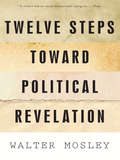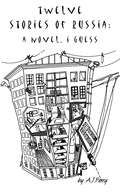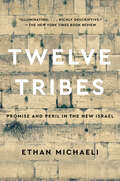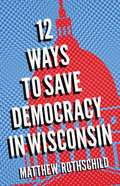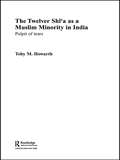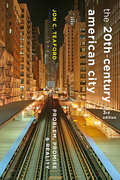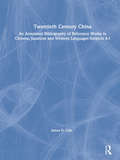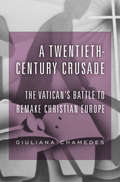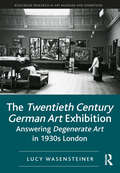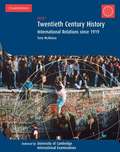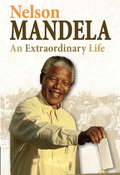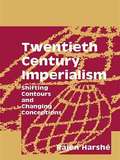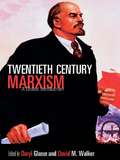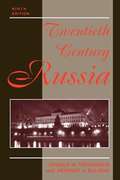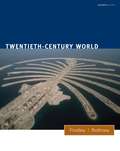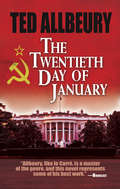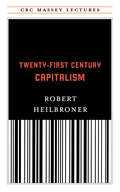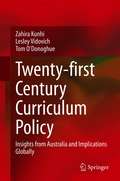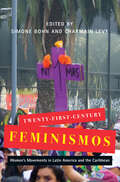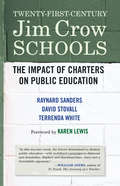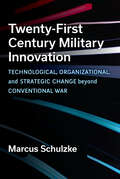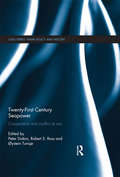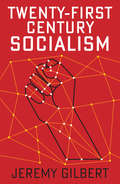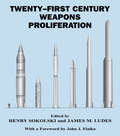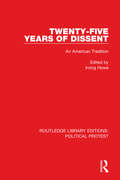- Table View
- List View
Twelve Steps Toward Political Revelation
by Walter MosleyIn his late teens and early twenties, Walter Mosley was addicted to alcohol and cigarettes. Drawing from this intimate knowledge of addiction and recovery, Mosley explores the deviances of contemporary America and describes a society in thrall to its own consumption. Although Americans live in the richest country on earth, many citizens exist on the brink of poverty, and from that profound economic inequality stems self-destructive behavior. InTwelve Steps to Political Revelation, Mosley outlines a guide to recovery from oppression. First we must identify the problems that surround us. Next we must actively work together to create a just, more holistic society. And finally, power must be returned to the embrace of the people. Challenging and original,Recovery confrontsboth self-understanding and how we define ourselves in relation to others.
Twelve Stories of Russia
by Anthony PerryHilariously funny adventures of a young American in new Russia, about his misconceptions, blunders, and revelations, his futile attempt to love vodka, his long-distance relationship with his American aunt. In his quest he witnesses the failed coup, rampant inflation, mafia fighting, and much else.
Twelve Tribes: Promise and Peril in the New Israel
by Ethan Michaeli“In Twelve Tribes, Ethan Michaeli proves he is a master portraitist – of lives, places, and cultures. His rendering of contemporary Israel crackles with energy, fueled by a historian’s vision and a journalist’s unrelenting curiosity.” — Evan Osnos, New York Times bestselling author of Age of Ambition and WildlandA groundbreaking portrait of contemporary Israel, revealing the polyphonic diversity of this extraordinary yet volatile nation by weaving together personal histories of ordinary citizens from all walks of life. In 2015, Israeli President Reuven Rivlin warned that the country’s citizens were dividing into tribes: by class and ethnicity, by geography, and along lines of faith: “In the State of Israel, the basic systems that form peoples’ consciousness are tribal and separate, and will most likely remain so.”In Twelve Tribes, award-winning author Ethan Michaeli portrays this increasingly fractured nation by intertwining interviews with Israelis of all tribes into a narrative of social and political change. Framed by Michaeli’s travels across the country over four years and his conversations with Israeli family, friends, and everyday citizens, Twelve Tribes illuminates the complex dynamics within the country, a collective drama with global consequences far beyond the ongoing conflict with the Palestinians.Readers will meet the aging revolutionaries who founded Israel’s kibbutz movement and the brilliant young people working for the country’s booming Big Tech companies. They will join thousands of ultra-Orthodox Haredim at a joyous memorial for a long-dead Romanian Rebbe in a suburb of Tel Aviv, and hear the life stories of Ethiopian Jews who were incarcerated and tortured in their homeland as “Prisoners of Zion” before they were able to escape to Israel. And they will be challenged, in turn, by portraits of Israeli Arabs navigating between the opportunities in a prosperous, democratic state and the discrimination they suffer as a vilified minority, as by interviews with both the Palestinians striving to build the institutions of a nascent state and the Israeli settlers seeking to establish a Jewish presence on the same land.Immersive and enlightening, Twelve Tribes is a vivid depiction of a modern state contending with ancient tensions and dangerous global forces at this crucial historic moment. Through extensive research and access to all sectors of Israeli society, Michaeli reveals Israel to be a land of paradoxical intersections and unlikely cohabitation—a place where all of the world’s struggles meet, and a microcosm for the challenges faced by all nations today.
Twelve Ways to Save Democracy in Wisconsin
by Matthew RothschildWisconsin, once a progressive stronghold led by Robert La Follette and others, inaugurated far-reaching reforms that broadened public involvement in civic affairs. A wave of innovative social programs aimed at making the state more egalitarian followed. In recent decades, however, the Badger State has become a laboratory for antidemocratic maneuvers that have increased the political influence of the super-rich and corporations while decreasing the power of voters. From tightening campaign finance laws and banning gerrymandering to rooting out structural racism and moving toward economic equality, each chapter focuses on one of the dozen reforms that are required to heal democracy within the state. Rothschild provides an in-depth rationale for each, dismantling the counterarguments against them and exploring the complexities involved in implementing them. He offers concrete proposals and action items for grassroots organizers and concerned community advocates to restore constituent control of state politics. This pocket-sized handbook is essential for politically aware citizens as well as journalists and watchdogs who see Wisconsin as a crucial battleground state and political bellwether for the nation.
The Twelver Shi'a as a Muslim Minority in India: Pulpit of Tears (Routledge Persian and Shi'i Studies)
by Toby HowarthOne of the most important current debates within and about Islam concerns its relation with power. Can Muslims be fundamentally content without power or as a minority? This book considers the voice of an important Muslim minority through its sermons. Indian Shi'i Muslims are a minority within a minority, constituting about ten to fifteen percent of the population as a whole, but comprising of about fifteen million people. Ten sermons are presented entirely and many more are quoted in order to analyze the preaching tradition in full. This book is the first survey to present the Indian mourning gathering and explain the history of this extraordinary phenomenon.
The Twentieth-Century American City: Problem, Promise, and Reality (The American Moment)
by Jon C. TeafordModern cities embody America’s successes and failures—while offering hope for the future.Throughout the twentieth century, the city was deemed a problematic space, one that Americans urgently needed to improve. Although cities from New York to Los Angeles served as grand monuments to wealth and enterprise, they also reflected the social and economic fragmentation of the nation. Race, ethnicity, and class splintered the metropolis both literally and figuratively, thwarting efforts to create a harmonious whole. The urban landscape revealed what was right—and wrong—with both the country and its citizens’ way of life. In this thoroughly revised edition of his highly acclaimed book, Jon C. Teaford updates the story of urban America by expanding his discussion to cover the end of the twentieth century and the first years of the next millennium. A new chapter on urban revival initiatives at the close of the century focuses on the fight over suburban sprawl as well as the mixed success of reimagining historic urban cores as hip new residential and cultural hubs. The book also explores the effects of the late-century immigration boom from Latin America and Asia, which has complicated the metropolitan ethnic portrait.Drawing on wide-ranging primary and secondary sources, Teaford describes the complex social, political, economic, and physical development of US urban areas over the course of the long twentieth century. Touching on aging central cities, technoburbs, and the ongoing conflict between inner-city poverty and urban boosterism, The Twentieth-Century American City offers a broad, accessible overview of America’s persistent struggle for a better city.
Twentieth Century China: An Annotated Bibliography of Reference Works in Chinese, Japanese and Western Languages
by James H. ColeThis bibliography of reference works from Chinese, Japanese and Western language sources covers: the 1911 Revolution; the Republic of China (1912-1949); the People's Republic of China (1949 onwards); post-1911 Hong Kong and Macau; and post-1911 overseas Chinese. Filled with helpful checklists, charts, and suggestions for further reading, this practical, comprehensive, and multidisciplinary guide takes readers through the entire case-writing process, including skills for writing both teaching cases and research cases. This edition includes new discussions of students as case writers, and how to interpret and respond to reviews, as well as updated and expanded material on video, multimedia and Internet cases.
A Twentieth-Century Crusade: The Vatican’s Battle to Remake Christian Europe
by Giuliana ChamedesGiuliana Chamedes offers the first comprehensive history of the Vatican’s efforts to defeat the forces of secular liberalism and communism through international law, cultural diplomacy, and a marriage of convenience with authoritarian and right-wing rulers.
The Twentieth Century German Art Exhibition: Answering Degenerate Art in 1930s London (Routledge Research in Art Museums and Exhibitions)
by Lucy WasensteinerThis book represents the first study dedicated to Twentieth Century German Art, the 1938 London exhibition that was the largest international response to the cultural policies of National Socialist Germany and the infamous Munich exhibition Degenerate Art. Provenance research into the catalogued exhibits has enabled a full reconstruction of the show for the first time: its contents and form, its contributors and their motivations, and its impact both in Britain and internationally. Presenting the research via six case-study exhibits, the book sheds new light on the exhibition and reveals it as one of the largest émigré projects of the period, which drew contributions from scores of German émigré collectors, dealers, art critics, and from the ‘degenerate’ artists themselves. The book explores the show’s potency as an anti-Nazi statement, which prompted a direct reaction from Hitler himself.
Twentieth Century History: International Relations Since 1919
by Tony McaleavyCambridge IGCSE Twentieth Century History covers the Cambridge IGCSE History syllabus and relates to the Twentieth Century core content. The theme of the book is International Relations from 1919 to the end of the 20th century. Lively and accessible text is based around lead questions matching those in the Cambridge IGCSE syllabus. Essential knowledge is provided through background briefings, analysis of issues through investigations and review sections to provide opportunities for revision.
Twentieth Century History Makers: An Extraordinary Life
by Ann KramerTwentieth Century History Makers: Nelson Mandela offers a fascinating and complete look at one of the 20th century's great leaders and humanitarians. Beginning with his early life in a rural part of South Africa, the book traces the course of Mandela's life - his legal studies, helping to found the ANC, freedom fighting, trial for treason and harsh imprisonment. The story continues with Mandela's release from prison, the incredible story of the defeat of apartheid and his election as president, retirement, humanitarian activities and his death and funeral in 2013.
Twentieth Century Imperialism
by Rajen HarsheMoving beyond the conventional parameters of capitalism, Rajen Harsh[ac]e probes concepts such as: colonialism, neo-colonialism, hegemony and social imperialism, in order to assess their theoretical and empirical validity in the context of the third world. Fresh perspectives are provided on the basis of examples drawn from a wide range of countries and by situating the discussions in the debates on imperialism in the third world.
Twentieth-Century Marxism: A Global Introduction
by Daryl Glaser David M. WalkerThis book outlines and assesses the Marxist tradition as it developed in the twentieth century, and considers its place and standing as we move into the twenty-first century. It is divided into three parts examining Marxism historically, geographically and thematically: Part 1 analyzes early Marxism in Russia and Europe as it developed after the death of Marx. Lenin, Trotsky, Luxemburg, Kautsky, Bernstein and the school of thought associated with them are all examined Part 2 deals with thinkers, debates and movements that followed the early Marxism focused on in part one, and includes chapters on Marxism in Europe, the Soviet Union, Africa, Asia and Latin America Part 3 is concerned with more contemporary debates in relation to Marxism and its standing and role today. The chapters in this section consider various themes including the relationship between theory and practice in Marxism, democratic procedure and liberties, Marxism as an economic critique of capitalism and Marxist methodology. Twentieth Century Marxism is not an introspective discussion of Marxism that would be of interest only to a limited number of specialists. Rather, it provides a thoughtful and stimulating contribution to debates about the role of Marxism today and its future direction.
Twentieth Century Russia
by Donald W. Treadgold Herbert J. EllisonDonald Treadgoldwas one of the most distinguished Russian historians of his generation. HisTwentieth Century Russia,a standard text in colleges and universities for several decades,has been regularly revised and expanded to reflect new events and scholarship. The present revision, by Professor Herbert Ellison, contains a major chapter on the Yeltsin era, and brings the Russian story to the final year of the century. Twice in the twentieth century the collapse of the Russian state and empire has been followed by an effort to build a democracy on the Western model. The first effort succumbed within a few months to Lenin's communist revolution, whose ideas and institutions dominated the history of Russia, and eventually much of the world, during the succeeding seventy-four years. In August 1991, an attempt by Soviet leaders to suppress democratic and nationalist movements unleashed by the Gorbachev reforms, and already victorious in Eastern Europe, precipitated instead an anti-communist revolution under the leadership of Boris Yeltsin. The revolution, and the sweeping transformation that followed, are treated in the new edition, which assesses the aims and scope of the first decade of Russia's second revolution. The transformation included a new constitutional structure, two fully democratic parliamentary elections and a presidential election (with another of each soon to come), a vigorous revival of political parties and political debate, and major questions about Russia's political future. Against the broad background of the Russian experience over a turbulent century, it raises the major questions: What are the prospects for Russiandemocracy? Why are the communists, following an anti-communist revolution, the most powerful parliamentary party in Russia's new parliament, and what is their impact? Why has the conversion to a market economy proved so difficult and painful, and what are its prospects? How has Russia related to the new states that were once fellow republics of the USSR? Why has the foreign policy of the new Russian democracy moved from a vision of partnership with the US to a reality of conflict and confrontation?Twentieth Century Russiaposes these questions, and many more, for the student and the general reader alike, against the fascinating background of Russia's experience before, during and since the era of communist rule, exploring the roots of current developments in the communist and pre-communist past.
Twentieth-Century World
by Carter Vaughn Findley John Alexander Murray RothneyEquipping readers with a solid understanding of "the big picture," the new Seventh Edition of Findley and Rothney's best-selling TWENTIETH-CENTURY WORLD thoroughly covers recent world history by focusing on themes of global interrelatedness, identity and difference, the rise of mass society, and technology versus nature. This unique thematic approach helps readers effectively place historical events in a larger context. Extensively revised and updated, the Seventh Edition integrates the latest, dramatic phases in world history, including more in-depth coverage of the economic growth of India and China, recent developments of the Israeli-Palestinian conflict, the global financial crash, the war on terror, new international environmental initiatives, and more.
The Twentieth Day of January: The Inauguration Day Thriller
by Ted Allbeury"Allbeury, like le Carré, is a master of the genre, and this novel represents some of his best work." — Booklist "A flawlessly structured plot." — Publishers Weekly"Uncannily predicted the rise of Donald Trump." — Slate.comIt's 1980 and the Cold War continues to rage. Seemingly out of nowhere, wealthy businessman Logan Powell has become President-elect and is only weeks away from assuming the most powerful position in the world on the twentieth day of January. Across the Atlantic, veteran British intelligence agent James MacKay uncovers shocking evidence that suggests something might be terribly wrong with the election. With the help of a reluctant CIA, MacKay sets out on a dangerous and daring mission to discover if the unthinkable has occurred: is President-elect Powell actually a puppet of the Soviet Union? Written by the bestselling author of The Crossing and Pay Any Price, this remarkably plausible thriller offers a heady mix of political intrigue and intense suspense — with the very future of America and the free world hanging in the balance. "Allbeury's novels have won a reputation not only for verisimilitude but for crisp, economical narration and high drama … there's no better craftsman." — Chicago Sun-Times"A most knowledgeable chronicler of espionage." — The New York Times Book Review "When I say Ted Allbeury knows where the bodies are buried I mean it literally. Truly a classic writer of espionage fiction." — Len Deighton, author of The Ipcress File
Twenty-First Century Capitalism (The CBC Massey Lectures)
by Robert HeilbronerA New York Times Notable Book What forms will capitalism take in the twenty-first century? To answer this question, noted economist and social philosopher Robert Heilbroner looks beyond economic theory to the social and political problems of modern economic society. In this sweeping examination of the past, present, and possible future, Heilbroner considers capitalism both as an economic system and a political order. He argues persuasively that, even in an increasingly globalized economy, government remains crucial to a healthy private sector, due to the limited ability of markets to order themselves, let alone make contributions to the common good such as tackling environmental problems or providing sufficient educational programs. Heilbroner concludes this penetrating technique by speculating on whether some more participatory forms of capitalism might emerge this century.
Twenty-first Century Curriculum Policy: Insights from Australia and Implications Globally
by Zahira Kunhi Lesley Vidovich Tom O'DonoghueThis book focuses on the phenomenon of a ‘21st century curriculum’ and its role in preparing students for work and life in a rapidly changing global knowledge society. Its context is the global and diverse national influences on education policy agendas. The central concepts in the academic literature that underpins the phenomenon are globalisation, curriculum, and policy. The analysis spans global influences on the development of ‘21st century curriculum’ policy, the construction of such policy at the national and State levels in Australia, and the enactment of such policy in three select case-study schools and in relation to which both similarities and differences are identified. The global to local span and the international relevance of the exposition are both revisited to highlight major findings, to discuss them in relation to recent literature and to offer propositions about ‘21st century curriculum’ development that are of wide interest and relevance. Recommendations for policy and practice as well as possible future directions for research in the field follow.
Twenty-First-Century Feminismos: Women's Movements in Latin America and the Caribbean (McGill-Queen's Studies in Gender, Sexuality, and Social Justice in the Global South #4)
by Simone Bohn and Charmain LevyThe women’s movement is a central, complex, and evolving socio-political actor in any national context. Vital to advancing gender equity and gendered relations in every contemporary society, the organization and mobilization of women into social movements challenges patriarchal values, behaviours, laws, and policies through collective action and contention, radically altering the direction of society over time.Twenty-First-Century Feminismos examines ten case studies from eight different countries in Latin America and the Caribbean to better understand the ways in which women’s and feminist movements react to, are shaped by, and advance social change. A closer look at women’s movements in Argentina, Brazil, Chile, Colombia, El Salvador, Haiti, Mexico, and Uruguay uncovers broader recurrent patterns at the regional level, such as the persistence of certain grievances historically harboured by regional movements, the rise in prominence of varying claims, and the emergence of novel organizational structures, repertoires, and mobilization strategies. Dissimilarities among the cases are also brought to light, including the composition of these movements, their success in effecting policy change in specific areas, and the particular conditions that surround their mobilization and struggles.Twenty-First-Century Feminismos provides a compelling account of the important victories attained by Latin American and Caribbean organized women over the course of the last forty years, as well as the challenges they face in their quest for gender justice.
Twenty-First-Century Jim Crow Schools: The Impact of Charters on Public Education
by Karen Lewis Raynard Sanders David Stovall Terrenda White Thomas PedroniHow charter schools have taken hold in three cities—and why parents, teachers, and community members are fighting backCharter schools once promised a path towards educational equity, but as the authors of this powerful volume show, market-driven education reforms have instead boldly reestablished a tiered public school system that segregates students by race and class. Examining the rise of charters in New Orleans, Chicago, and New York, authors Raynard Sanders, David Stovall, and Terrenda White show how charters—private institutions, usually set in poor or working-class African American and Latinx communities—promote competition instead of collaboration and are driven chiefly by financial interests. Sanders, Stovall, and White also reveal how corporate charters position themselves as “public” to secure tax money but exploit their private status to hide data about enrollment and salaries, using misleading information to promote false narratives of student success.In addition to showing how charter school expansion can deprive students of a quality education, the authors document several other lasting consequences of charter school expansion: • the displacement of experienced African American teachers • the rise of a rigid, militarized pedagogy such as SLANT • the purposeful starvation of district schools • and the loss of community control and oversight A revealing and illuminating look at one of the greatest threats to public education, Twenty-First-Century Jim Crow Schools explores how charter schools have shaped the educational landscape and why parents, teachers, and community members are fighting back.
Twenty-First Century Military Innovation: Technological, Organizational, and Strategic Change beyond Conventional War
by Marcus SchulzkeContemporary war is as much a quest for decisive technological, organizational, and doctrinal superiority before the fighting starts as it is an effort to destroy enemy militaries during battle. Armed forces that are not actively fighting are instead actively reengineering themselves for success in the next fight and imagining what that next fight may look like. Twenty-First Century Military Innovation outlines the most theoretically important themes in contemporary warfare, especially as these appear in distinctive innovations that signal changes in states’ warfighting capacities and their political goals. Marcus Schulzke examines eight case studies that illustrate the overall direction of military innovation and important underlying themes. He devotes three chapters to new weapons technologies (drones, cyberweapons, and nonlethal weapons), two chapters to changes in the composition of state military forces (private military contractors and special operations forces), and three chapters to strategic and tactical changes (targeted killing, population-centric counterinsurgency, and degradation). Each case study includes an accessible introduction to the topic area, an overview of the ongoing scholarly debates surrounding that topic, and the most important theoretical implications. An engaging overview of the themes that emerge with military innovation, this book will also attract readers interested in particular topic areas.
Twenty-First Century Seapower: Cooperation and Conflict at Sea (Cass Series: Naval Policy and History)
by Peter Dutton Robert S. Ross Øystein TunsjøThis book offers an assessment of the naval policies of emerging naval powers, and the implications for maritime security relations and the global maritime order. Since the end of the Cold War, China, Japan, India and Russia have begun to challenge the status quo with the acquisition of advanced naval capabilities. The emergence of rising naval powers is a cause for concern, as the potential for great power instability is exacerbated by the multiple maritime territorial disputes among new and established naval powers. This work explores the underlying sources of maritime ambition through an analysis of various historical cases of naval expansionism. It analyses both the sources and dynamics of international naval competition, and looks at the ways in which maritime stability and the widespread benefits of international commerce and maritime resource extraction can be sustained through the twenty-first century. This book will be of much interest to students of naval power, Asian security and politics, strategic studies, security studies and IR in general.
Twenty-First Century Socialism (Radical Futures)
by Jeremy GilbertWhat causes climate change, social breakdown, rampant inequality and the creeping spread of ubiquitous surveillance? Capitalism. What is the only alternative to capitalism? Socialism. Socialism cannot, however, remain static if it is going to save civilisation from these catastrophes. In this urgent manifesto for a 21st century left, Jeremy Gilbert shows that we need a revitalised socialist politics that learns from the past to adapt to contemporary challenges. He argues that socialism must overcome its industrial origins and give priority to an environmental agenda. In an age of global networks, digital technology and instant communication, central government diktat and restrictions on free speech and movement must be jettisoned. We need to control the economy rather than let it control us - but we must do this by empowering workers, citizens and communities to run their world their way. It’s time to take back the wealth, the services and the platforms that our own energy has built. In the digital age, it’s time for a new socialism.
Twenty-First Century Weapons Proliferation: Are We Ready?
by Henry Sokolski James M. LudesLeading US security practitioners fromt he Ford, Carter, Reagan, Bush and Clinton administrations, plus other experts on proliferation, clarify the weapons proliferation threats that the US and its allies will face, and suggest what new policies their governments should consider.
Twenty-Five Years of Dissent: An American Tradition (Routledge Library Editions: Political Protest #25)
by Irving HoweThis book, first published in 1979, is a representative sample of some of the best articles that have appeared in DISSENT, the American democratic socialist quarterly. They provide a two-sided view of political and social action with the democratic society of the USA.
